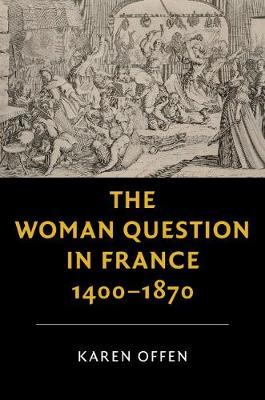New Studies in European History
2 total works
This is a revolutionary reinterpretation of the French past from the early fifteenth century to the establishment of the Third Republic, focused on public challenges and defenses of masculine hierarchy in relations between women and men. Karen Offen surveys heated exchanges around women's 'influence'; their exclusion from 'authority'; the increasing prominence of biomedical thinking and population issues; concerns about education, intellect, and the sexual politics of knowledge; and the politics of women's work. Initially, the majority of commentators were literate and influential men. However, as more and more women attained literacy, they too began to analyze their situation in print and to contest men's claims about who women were and should be, and what they should be restrained from doing, and why. As urban print culture exploded and revolutionary ideas of 'equality' fuelled women's claims for emancipation, this question resonated throughout francophone Europe and, ultimately, across the seas.
Debating the Woman Question in the French Third Republic, 1870-1920
by Karen Offen
Published 6 December 2017
Karen Offen offers a magisterial reconstruction and analysis of the debates around relations between women and men, how they are constructed, and how they should be organized, that raged in France and its French-speaking neighbors from 1870 to 1920. The 'woman question' encompassed subjects from maternity and childbirth, and the upbringing and education of girls to marriage practices and property law, the organization of households, the distribution of work inside and outside the household, intimate sexual relations, religious beliefs and moral concerns, government-sanctioned prostitution, economic and political citizenship, and the politics of population growth. The book shows how the expansion of economic opportunities for women and the drop in the birth rate further exacerbated the debates over their status, roles, and possibilities. With the onset of the First World War, these debates were temporarily placed on hold, but they would be revived by 1916 and gain momentum during France's post-war recovery.

